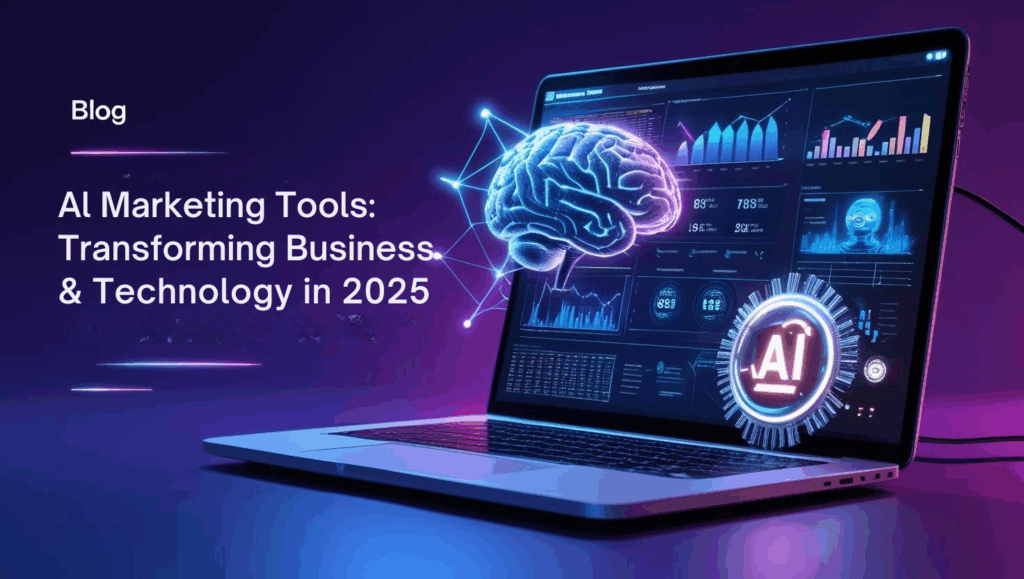The marketing world is undergoing a massive transformation. Gone are the days when gut feelings and basic analytics drove decisions. Today, the most successful companies harness artificial intelligence (AI) to predict customer behaviour, create personalised experiences, and optimise campaigns with unparalleled precision.
AI marketing tools are no longer optional—they’re essential. By 2025, businesses leveraging AI-driven strategies report 80% higher conversion rates and 37% faster revenue growth compared to traditional methods.
What Are AI Marketing Tools, and Why Do They Matter?
AI marketing tools utilize advanced technologies, including machine learning, natural language processing, and predictive analytics, to streamline and enhance marketing efforts. These intelligent systems analyse vast customer data, identify actionable patterns, and make real-time decisions to improve campaign performance.
But their impact goes far beyond simple automation. With AI marketing tools, businesses can:
- Predict customer behaviour with up to 85% accuracy.
- Personalise content at scale, reaching millions of users effortlessly.
- Optimise ad spending, adjusting budgets automatically for maximum ROI.
The Game-Changing Impact on Businesses
Businesses that implement AI marketing tools see measurable results. Revenue attribution becomes more transparent, customer acquisition costs drop by an average of 42%, and marketing teams can shift their focus from tedious manual tasks to strategic decision-making.
For small businesses, AI tools are levelling the playing field. In the past, sophisticated marketing analytics were reserved for enterprises with massive budgets and dedicated data science teams. Today, AI marketing platforms offer similar capabilities at affordable prices, empowering smaller players to compete effectively.
The State of AI Marketing Technology in 2025
The AI marketing landscape has seen remarkable growth, with tools now offering seamless integration, real-time functionality, and user-friendly solutions.
Key Technological Advancements
1. Real-Time Processing
Modern AI tools analyse customer interactions instantly, enabling dynamic personalisation and on-the-fly campaign optimisation for higher engagement.
2. Predictive Analytics
AI systems now predict customer lifetime value, churn probabilities, and optimal purchasing times with incredible accuracy, driving more innovative marketing and sales decisions.
3. Natural Language Generation
AI-powered tools now produce human-like copy for emails, ads, and social media posts, ensuring brand consistency without sacrificing creativity.
Seamless Integrations
AI marketing tools now form part of a connected ecosystem. CRM platforms, content creators, and social media schedulers work together, automating workflows and delivering cohesive customer experiences.
Top AI Marketing Tools for 2025
Choosing the right AI marketing tool depends on your needs, goals, and scale. Here’s a look at five industry leaders shaping the marketing landscape:
1. HubSpot Marketing Hub AI
HubSpot elevates inbound marketing with predictive analytics, innovative lead scoring, and automated A/B testing.
- Best For: Mid-sized businesses seeking an all-in-one marketing and CRM solution.
2. Jasper AI
Jasper revolutionises content creation, generating high-quality blog posts, social media captions, and ad copy in seconds.
- Best For: Teams needing large volumes of creative content quickly.
3. Salesforce Einstein Marketing Cloud
Einstein offers enterprise-level predictive analytics, customer journey mapping, and dynamic content personalisation.
- Best For: Large organisations with complex customer data and multi-channel needs.
4. Google Analytics Intelligence
Google’s AI-powered analytics provide actionable insights through predictive metrics and anomaly detection.
- Best For: Companies focused on deep website performance and data-driven decisions.
5. Marketo Engage AI
Marketo optimises B2B operations with intelligent lead scoring, automated nurturing, and advanced attribution modelling.
- Best For: B2B businesses with long sales cycles requiring in-depth lead management.
AI Marketing Tools for Small Businesses: A Step-by-Step Guide
Small businesses can harness AI marketing tools without breaking the bank by starting small and scaling gradually. Small AI businesses will do much better than top online businesses that do not use AI.
Practical Implementation
- Phase 1: Build a Data Foundation
- Ensure data tracking and collection systems are in place for actionable results.
- Phase 2: Start with One Tool
- Master a single AI tool before expanding to avoid complexity and overwhelm.
- Phase 3: Automate Workflows
- Integrate your chosen tool with existing systems to reduce manual tasks and streamline operations.
- Phase 4: Optimise and Evolve
- Use AI insights to continuously refine strategies, improving performance over time.
Budget-Friendly AI Tools for Small Teams
- Mailchimp AI for email automation.
- Canva AI for graphic design.
- Buffer AI for social media management.
- ChatGPT integrations for brainstorming or content creation.
Emerging AI Marketing Trends
Conversational AI
AI chatbots and virtual assistants are becoming more advanced, managing complex customer interactions while maintaining a personal touch.
Predictive Journey Mapping
AI now anticipates customer behaviours across their entire journey, enabling proactive outreach and improved retention strategies.
Privacy-First Marketing
With stricter privacy regulations, AI tools are evolving to focus on consent-based data collection and anonymised analysis.
Overcoming AI Marketing Challenges
Successful adoption of AI tools depends on addressing common hurdles:
- Data Quality: Establish governance to ensure reliable insights.
- Team Training: Offer education to help your team embrace AI as a supportive tool.
- Seamless Integration: Use platforms with strong API capabilities for smooth adoption.
- Measuring ROI: Track key metrics like customer acquisition cost and conversion rates to demonstrate value.
Conclusion: Embracing AI Marketing for Growth
AI marketing tools are no longer futuristic—they’re vital. Businesses that adopt them gain a competitive edge through improved efficiency, better personalisation, and data-driven decision-making.
For small businesses, AI levels the playing field, offering enterprise-grade capabilities at accessible prices. By starting small, focusing on clear goals, and evolving gradually, any company can unlock AI’s transformative potential.
The future of marketing is here. The question is, will your business embrace it?



